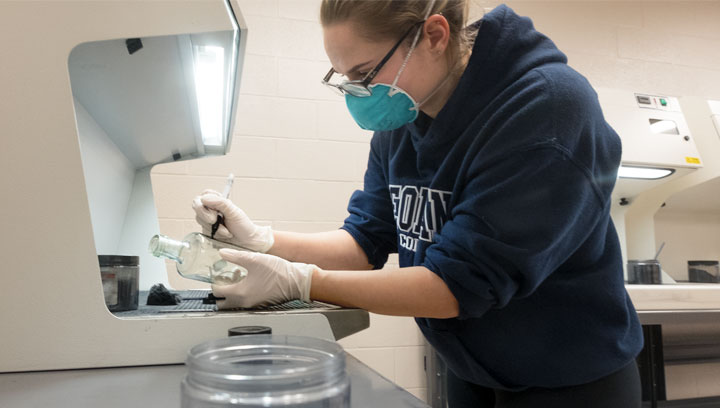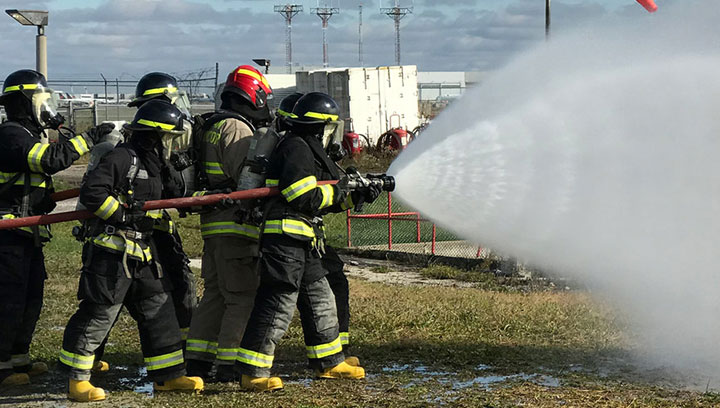
Serve and protect your community with a career in policing
Honours Bachelor of Police Studies Honours Bachelor Degree program
Broaden your understanding of the nature, role and function of policing. Learn the science and application behind it. Excel in your career.
Advanced Standing (BAPA) +
Part-time
Program information
Program description
The Honours Bachelor of Police Studies degree encourages a broadened critical understanding of the nature, role and function of policing. Students will explore a variety of topics offering opportunities for careers in law enforcement. The program learning outcomes value an integrated learning approach to police education that will provide a diverse range of students with the critical mix of professionalism, technical/legal expertise and analytical skills necessary to succeed in justice-related careers. This multi-dimensional degree complements, rather than duplicates, existing educational initiatives, offering courses that encourage increasing levels of thinking and analysis, which are dynamic in design, rationale and delivery. The learning outcomes are designed to directly calibrate with the policing community and its high professional standards.
Intake information
| Start date | Campus |
|---|---|
| Fall 2025 | Orillia |
Tuition and fees
- Visit our tuition and fees page for detailed information on the cost to attend Georgian.
- Review additional program-specific fees for this program.
- You can afford this! Explore OSAP as well as awards, scholarships and bursaries to help you pay your way to graduation.
Work-integrated learning
- This program includes a co-op work term component where you’ll gain experience in a workplace related to your field of study.
- Learn about types of work-integrated learning at Georgian.
What are the admission requirements for the Honours Bachelor of Police Studies program?
Honours Bachelor of Police Studies admission requirements
- Ontario Secondary School Diploma (OSSD), or equivalent, mature student status
- minimum overall average of 65 per cent
- six Grade 12 U or M level courses
- Grade 12 English (U)
Note: Police Foundations diploma graduates can apply to our advanced standing stream through OCAS using the major code of BAPA.
Mature applicants may also be considered for admission to this program providing their previous school performance and/or recent work record suggests a strong possibility of academic success. In order to qualify, applicants must be 19 years of age on or before the commencement of the program and must have been away from formal education for at least one year immediately prior to beginning studies. Mature applicants must meet subject prerequisites prior to registration.
Applicants should be aware that first-year enrolment is limited; satisfying minimum entrance requirements does not guarantee admission.
Selection Process
Selection is based on academic grades and subject prerequisites; applicants must meet minimum averages to receive final acceptance.
Additional information
The College has been granted consent by the Minister of Training, Colleges and Universities to offer this degree. The college shall ensure that all students admitted to the above-named program during the period of consent will have the opportunity to complete the program within a reasonable time frame.
Non-core courses are required in all degree programs to meet the Ministry of Colleges and Universities benchmark for depth and breadth in degree-level learning. These courses are designed to give students the tools to develop interdisciplinary perspectives that inform their approach to their own discipline, their continued education and their life outside work.
Students are required to take: at least one first year interdisciplinary course (INTS1xxx); two introductory courses in their choice of disciplines outside their main field of study, which may include psychology (PSYC 1000 or PSYC 1001), social science (SOCI 1000), humanities (HUMA 1012), or science (SCEN 1000); one advanced course in a discipline (ex. PSYC3xxx, SOSC3xxx, HUMA3xxx), and; one upper level interdisciplinary course (INTS4xxx). These courses and any remaining non-core course requirements to be selected from the program list.
Please Note
In Canada the various federal, provincial and municipal acts and regulations outline special requirements for those entering a career as a law enforcement officer. Students wishing to pursue such careers should ensure that they will be able to meet the physical and educational requirements before enrolling. Potential students with a criminal record will need to discuss their personal situations with college before enrolling in the program. In some cases an official criminal record may make it more difficult for students to complete the program requirements and find related employment after graduation.
What career paths can I take in policing?
Your Honours Bachelor of Police Studies degree gives you many career opportunities
This program will prepare our graduates with a variety of career and educational opportunities. The primary career categories include the Ontario Provincial Police Service and municipal police services. Opportunities may also include out-of-province police services, Royal Canadian Mounted Police, Canadian Armed Forces, By-Law Enforcement, Private Police and Investigators, Canada Border Services and Corrections.
Pathways
Transfer options
Graduates of Police Foundations, Community and Justice Services and Protection, Security and Investigation may receive up to two years of advanced standing toward the unique four-year Honours Bachelor of Police Studies degree.
Already working in the field?
Fast-track your degree with advanced standing through our online Honours Bachelor of Police Studies degree offered on a part-time basis. Qualified first-class constables can receive advanced standing for 50 per cent of the program and up to an additional exemption of 25 per cent for postsecondary education. We welcome students from all over Canada and from a range of ranks and backgrounds including military police, Royal Canadian Mounted Police (RCMP), Ontario Provincial Police (OPP) and other policing agencies.
Meet our faculty
Learn from passionate. experienced professors
-

Eleanor Gittens
BA, M.Sc., PhD, Professor
-

Lance Triskle
BA, LLB, LLM, Professor
-

Melanie Marchand
BA, MA, Professor and Program Coordinator
-

Wendy Blank
BA, MA, PhD, Professor
What courses are included in the Honours Bachelor of Police Studies degree program?
Course overview
27 Core Courses
4 Non-Core Courses
1 Non-Core Psychology Course
4 Elective Courses (Specialty Topics: Core or Non-Core)
4 Elective Non-Core Courses
1 Co-op Work Term
Note: The advanced standing stream follows the curriculum and progression for the Fall 2023 intake.
Program-specific courses
Semester 1 courses are listed below. For a full list of courses in the program including course descriptions, view the Honours Bachelor of Police Studies program outline.
- POLC 1000 – Introduction to Police Studies
- POLC 1001 – Strategic Communications
- POLC 1002 – Canadian Criminal Justice
- POLC 1009 – Diversity, Equity, and Human Rights
- INTS 1007 – Interdisciplinary Modes of Communication
Your course delivery method(s)
GC Flex
This program is delivered via GC Flex, giving you choice and flexibility. Using technology-enabled, purpose-designed learning spaces, professors deliver lectures and labs in the classroom and simultaneously online. You can participate on campus or online during class or review course materials online later.
Hybrid
This program has a hybrid delivery method. Some parts are online and other parts are delivered in person. You’ll need to come to campus for part of your program.
Please note, delivery methods are based on planning for the upcoming semester and are subject to change.
Check out our other related programs
Community and Justice Services
Knowledge is built upon a foundation of strong experiences. Learn from experts and build the skills to change your community.
Protection, Security and Investigation
We connect students to extraordinary learning experiences that inspire innovation and prepare our graduates for life and career success.
Police Foundations
Extraordinary learning experiences and community connections. Develop your knowledge and competitive skills for life and career success.
Pre-service Firefighter Education and Training
Develop your knowledge and skills with hands-on experience in fire suppression, rescue, hazardous materials response, public education and life safety.
Do you have questions about Honours Bachelor of Police Studies? Contact us!
Thinking about applying to Georgian?
Contact our student recruitment team to explore your study options.
Already applied to Georgian?
Connect with the Office of the Registrar for admissions-related questions.
Are you an international student?
Contact our international recruitment team to learn more about studying at Georgian.
Ways to connect

Attend a GTKG virtual info. session on August 12th at 5 p.m.
Register for an upcoming session
Take a guided, in-person tour
of our campuses.
Book a campus tour.
Book a phone appointment
with a recruitment specialist.
Connect with a recruiter.
Join our email list for event updates, contest information and more.
Sign up for Georgian updates.







